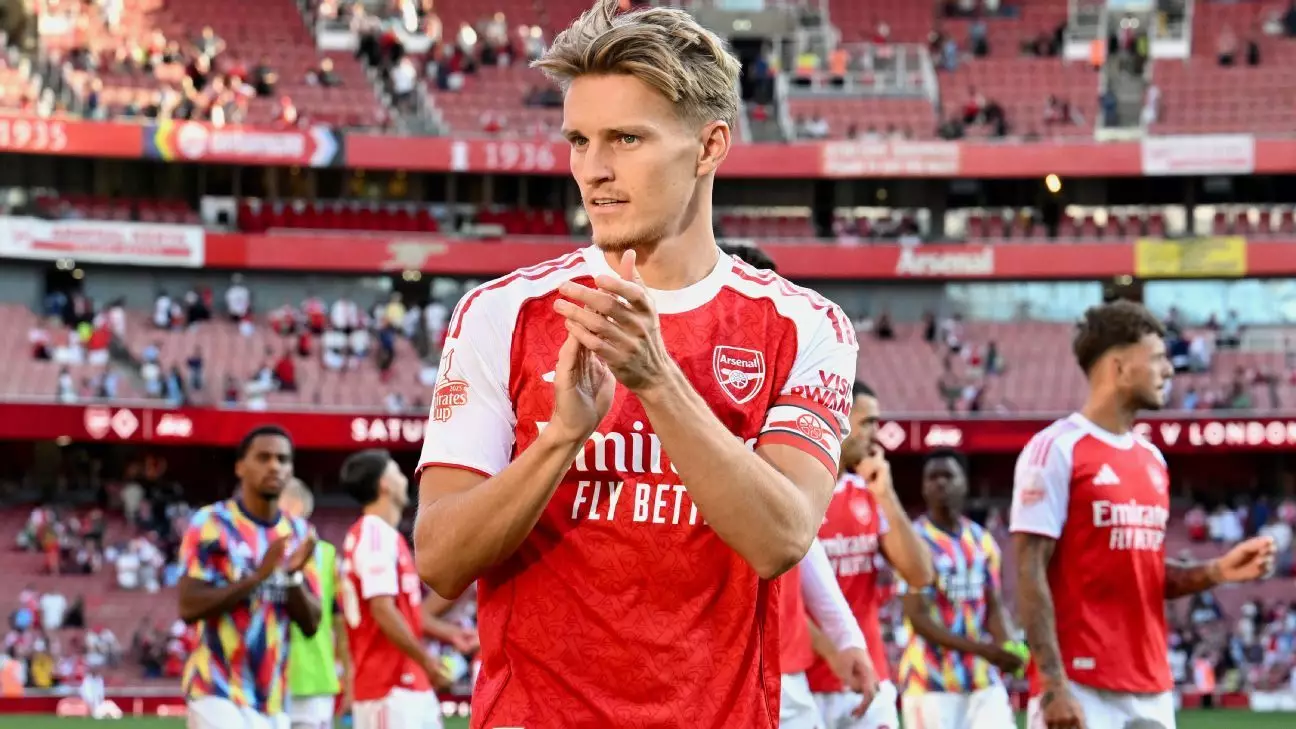In the high-stakes arena of Premier League football, the role of a captain often transcends mere armband symbolism. It embodies leadership, influence, and a guiding force that can steer a team through adversity. Yet, recent debates surrounding Arsenal’s captaincy reveal that assigning leadership is far more complex than selecting the most experienced or vocal player. Mikel Arteta’s unwavering support for Martin Ødegaard underscores a crucial insight: genuine leadership is fundamentally rooted in respect and consensus among players, not just the coach’s preference or external opinions.
Former Arsenal legend Tony Adams voiced a controversial opinion, suggesting that without Declan Rice as captain, Arsenal’s ambitions for a league-winning season might falter. Adams’ stance echoes a common belief that a more physical, command-driven figure is necessary for success at the highest level. However, Arteta’s response highlights a Bold truth: team leadership should be a reflection of collective trust, cultivated through transparent processes like voting rather than superficial assumptions. When the squad overwhelmingly supports Ødegaard, it becomes obvious that authenticity, humility, and peer recognition outweigh traditional notions of “leadership presence.”
This approach challenges us to rethink conventional leadership archetypes. In an era where player empowerment and psychological influence are increasingly valued, the captain’s role has evolved into that of a person who embodies the collective spirit rather than individual dominance. Arteta’s decision demonstrates that authentic leadership is built on players’ conviction, and not on preconceived notions about stature or personality. This shift signifies a broader cultural move within football, where the emphasis on player buy-in and shared vision takes precedence over top-down authority.
Building Trust: The Key to Sustainable Leadership on and off the Field
Trust is the cornerstone of effective leadership, especially in the high-pressure environment of top-flight football. Arteta’s emphasis on the voting process reveals that leadership should be a democratic choice, one that is rooted in confidence rather than coercion. When players feel represented and respected, their commitment deepens, leading to improved cohesion and better performance. This is particularly relevant for Arsenal, a club that aspires not only for domestic dominance but also for success in Europe.
The coach’s insistence on the squad’s unanimous support for Ødegaard signals a strategic understanding: leadership must be authentic. Artificial assignments or fashionable choices, like appointing Rice solely based on reputation, risk undermining team morale. Instead, empowering players to choose their leader cultivates a culture of responsibility and mutual respect. Such an environment fosters resilience, as players are more likely to rally behind a captain they have had a hand in electing—someone they genuinely believe can motivate, support, and represent them.
This model of leadership also has implications beyond football. It underscores the importance of inclusivity and participative decision-making in various organizational settings. Success depends not just on individual talent but on the collective confidence toward a leader chosen through transparent, merit-based processes. As Arsenal’s leadership reveals, trust can be a more potent force than authority, especially when striving for excellence amid fierce competition.
Adapting to Change: The Role of Rules and Discipline in Elevating the Game
While leadership manifests in the dressing room, the game itself is shaped by regulations and discipline. Arteta’s remarks about recent rule changes directed at curbing timewasting and unsporting behavior shed light on the importance of a fair playing field. His recognition that last season’s strict enforcement initially disrupted flow reveals the delicate balance officials must maintain between enforcing rules and allowing natural game rhythm.
Arsenal’s coach advocates for consistency and clarity in officiating, emphasizing that players’ understanding of rules impacts the quality of the league. When referees communicate expectations effectively, teams can adapt and play at their highest potential without fear of unfair punishment. Arteta’s confidence that improvements are on the horizon reflects a proactive leadership mindset—one that seeks to influence not only on-pitch tactics but also the wider structural framework of the sport.
This balance between discipline and fluidity is vital for elevating the Premier League to new heights. It presses football authorities and officials to uphold transparency and fairness, which ultimately benefits clubs, players, and fans. When rules are applied decisively and uniformly, the sport’s integrity is preserved, creating an environment where talent and strategy can flourish unimpeded by inconsistent enforcement.
The Power of Collective Belief: Leadership Beyond the Individual
Arteta’s public defense of Ødegaard reaffirmed a crucial lesson: leadership is most potent when it emerges from collective belief rather than imposed authority. The captaincy debate exemplifies a broader truth—effective teams are built on shared values, mutual confidence, and open communication. When leaders earn their role through respect rather than relics of status, they foster a sustainable environment for growth and success.
In this context, Arsenal is setting a compelling example for other clubs and organizations. Leadership is fundamentally about trust, and that trust must be nurtured through transparency, inclusivity, and understanding players’ perspectives. When the team’s heartbeat beats in harmony with a shared vision, individual authority matters less than collective conviction.
The unfolding narrative around Arsenal’s captaincy shows that true leaders are those who inspire loyalty not through commands but through their ability to unite and empower. As the season progresses, this approach will determine whether the Gunners can translate their collective belief into tangible victories, challenging the conventional paradigms of leadership in football and beyond.

